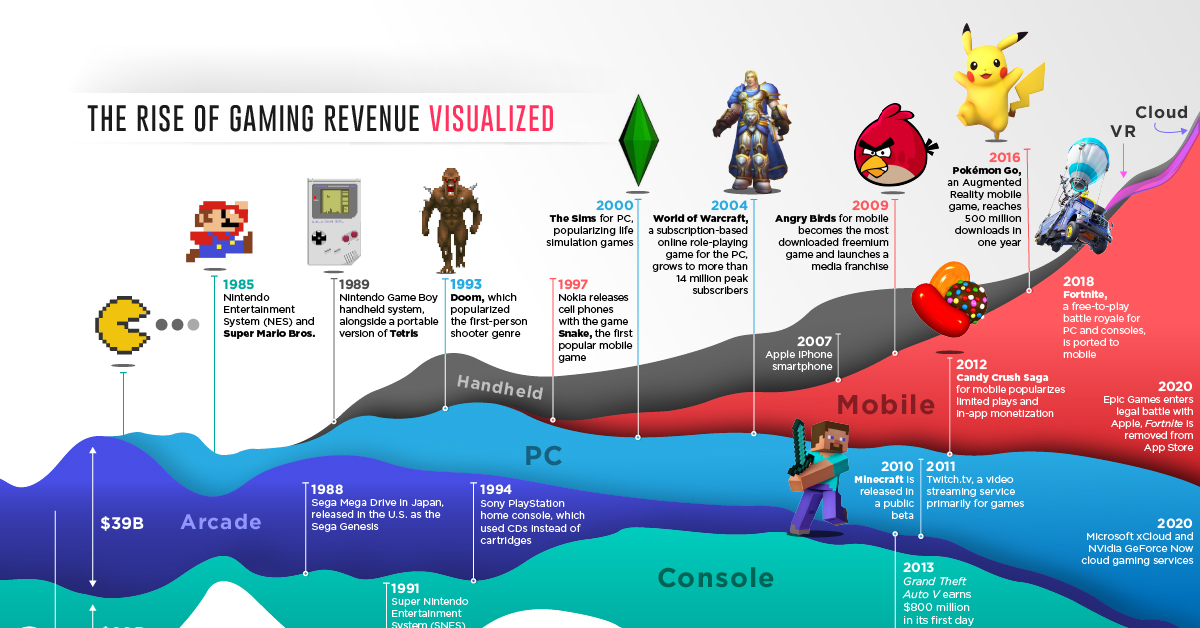

50 Years of Gaming History, by Revenue Stream (1970-2020)
Visualizing 50 years of gaming history, from the first wave of arcades and home consoles to a tsunami of mobile gaming.
 www.visualcapitalist.com
www.visualcapitalist.com


 www.visualcapitalist.com
www.visualcapitalist.com
If you do that then you'd prolly wanna eat some of the phone numbers too since they definitely are cannibalizing the handheld market way more than the switch is.Seems like PC is still expanding while console is stagnating (although you could maybe claim that it's actually declining since they consider the switch a console so you sorta combined the handheld into the console market).
Demon's Souls and Bloodborne on PC when Sony?I read the graph wrong. Seems like PC is growing slowly while consoles are stagnating, like meiam said. No wonder Sony is porting their games.

I meant comparing the trend over time, if you classified the switch as handheld, then presumably the latest figure for consoles would be lower, which would show a decline since the 2010s. The switch is categorized as a console, but really it's an handheld (can be played on integrated screen without being plugged into a wall), if you consider it a console, then you would have to classify the PSP and PSvita as console too (they could also be plugged into a TV to play on a big screen just like the switch), in which case this the "console" market would also show a decrease, since a large portion of the 2010s handheld revenue would be shifted to consoles then.If you do that then you'd prolly wanna eat some of the phone numbers too since they definitely are cannibalizing the handheld market way more than the switch is.
Not to mention the fact that there are a shitload of people who would never play a console or PC game, but will play games on their phone. People don't even shit without their phones with them and it's hard not to have at least one game of some sort on your phone. It's where those terrible feminist activist sites get their data that the majority (like 57%) of gamers are women....because they don't tell you that a lot of grandma's are playing Candy Crush or Alphabetty and shit now, let alone inform people that those numbers are mostly derived from games off cell phones.I'd love to see the same graph but inflation adjusted, gaming is becoming very cheap as a hobby, I'd reckon there's far more people gaming now than in 1980 (where the graph show a 20B$ number, which would be something like 60BS in today dollar). Consoles and games prices have hardly move in real dollars over the last few decades, I think there's more people gaming but each person yield much less money (inflation adjusted).
I read the graph wrong. Seems like PC is growing slowly while consoles are stagnating, like meiam said. No wonder Sony is porting their games.
A lot of Japan is mobile or portable tooChina.
Over 50% of the vidya market is mobile there. Several factors, including the ban on consoles that was lifted only five years ago, created this kind of gaming culture.
Plus it's pretty fun to play vidya on your phone during your commute to work and back (before you-know-what happened and we actually had jobs we went to)
The idea of mobiles is that you play the games in short bursts. So while there's no issue in porting games for it (including RPGs), that's not really what they're meant for. I mean, if you have time to sit down and play something, would a mobile be your first choice?I play fate grand order which is a console game on a phone and I'm enjoying it a ton but most other phone stuff feels too limited for me. Outside of like, card games and whatnot. I legit don't get why more people don't make full-fledged games and make stuff that plays itself or stuff that's like a basic flash game from 20 years ago. Phones can handle Jrpgs and whatnot easily for example but people don't harness them for that.
Sometime after the Age of Dark.Demon's Souls and Bloodborne on PC when Sony?
I rarely say this on environmental issues, but cloud gaming isn't something I'm too concerned about. As in:Another thing I wondered about is the parameters it’s using for cloud gaming, since technically couldn’t any platform with online capabilities also have cloud functionality or services? Or is it strictly dedicated cloud devices or providers? Probably that.
Another thing to consider if that ever takes off -

It doesn't HAVE to be that way. You could also...not. You could just make a proper Jrpg like in the handhelds of the past 25 years, one you could sink hundreds of hours in 8 hours per session. FGO is like that, especially during the storymode segments, with multiple 20+ minute long cutscenes between fights.The idea of mobiles is that you play the games in short bursts. So while there's no issue in porting games for it (including RPGs), that's not really what they're meant for. I mean, if you have time to sit down and play something, would a mobile be your first choice?
I'm all for porting RPGs to mobile, but you wouldn't design a game for mobile from the ground up to be played 8 hours at a time.It doesn't HAVE to be that way. You could also...not. You could just make a proper Jrpg like in the handhelds of the past 25 years, one you could sink hundreds of hours in 8 hours per session. FGO is like that, especially during the storymode segments, with multiple 20+ minute long cutscenes between fights.
